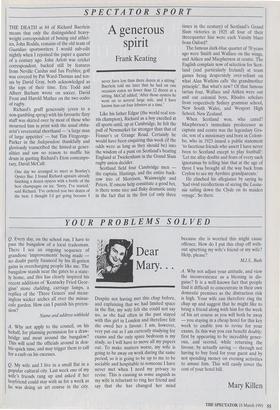SPECTATOR SPORT
A generous
spirit
Frank Keating
THE DEATH at 84 of Richard Baerlein means that only the distinguished heavy- weight correspondent of boxing and athlet- ics, John Rodda, remains of the old team of Guardian sportswriters I would sub-edit nightly when I rejoined the paper a quarter of a century ago. John Arlott was cricket correspondent, backed still by features from Neville Cardus and Ian Peebles; golf was covered by Pat Ward-Thomas and ten- nis by David Gray, both acknowledged as the tops of their time. Eric Todd and Albert Barham wrote on soccer, David Frost and Harold Mather on the two codes of rugby.
Richard's gruff generosity (even to a non-gambling sprog) with his favourite fizzy stuff was skirted over by most of those who mourned him in print with the usual obitu- arist's reverential shorthand — 'a large man of large appetites' — but Tim Fitzgeorge- Parker in the Independent thankfully and gloriously transcribed the hinted-at gener- alities and saw no reason to muffle his drum in quoting Richard's Eton contempo- rary, David McCall:
One day we arranged to meet at Bentley's Oyster Bar. I found Richard upstairs already finishing a dozen oysters with a bottle of the best champagne on ice. 'Sorry, I've started,' said Richard. 'I've ordered you two dozen of the best. I thought I'd get going because I never have less than three dozen at a sitting.' Baerlein told me later that he had on one occasion eaten no fewer than 12 dozen at a sitting. McCall added, 'After those oysters he went on to several large sole, and I have known him eat four lobsters at a time.'
Like his father Edgar (the world real ten- nis champion), Richard as a boy excelled at all sports until, up at Cambridge, he felt the pull of Newmarket far stronger than that of Fenner's or Grange Road. Certainly he would have been enquiring this week (if the odds were as long as they should be) into the wisdom of a punt on Scotland's beating England at Twickenham in the Grand Slam rugby union decider. Scotland field four Cambridge men the captain, Hastings, and the entire back- row trio of Morrison, Wainwright and Peters. If omens help constitute a good bet, is there some nice and fluky dramatic unity in the fact that in the first (of only three times in the century) of Scotland's Grand Slam victories in 1925 all four of their threequarter line were each Varsity blues from Oxford?
The famous dark-blue quartet of 70 years ago were Smith and Wallace on the wings, and Aitken and Macpherson at centre. The English complain now of selection for Scot- land (and particularly Ireland) at team games being desperately over-reliant on what Alan Watkins calls 'the grandmother principle'. But what's new? Of that famous tartan four, Wallace and Aitken were out and out colonial boys, Rhodes scholars from respectively Sydney grammar school, New South Wales, and Wesport High School, New Zealand.
When Scotland won, who cared? Macpherson's immediate predecessor as captain and centre was the legendary Gra- cie, son of a missionary and born in Colom- bo, who in 1923 issued a public statement `to facetious friends who assert I have never been to Scotland except to play football': `Let me allay doubts and fears of every such ignoramus by telling him that at the age of three I was brought all the way back from Ceylon to see my Ayrshire grandparents.'
He clinched his allegiance by saying he tad vivid recollections of seeing the Lusita- nia sailing down the Clyde on its maiden voyage'. So there.


























































 Previous page
Previous page